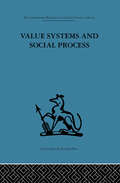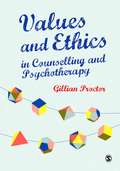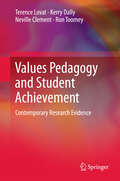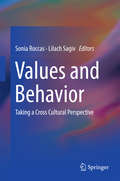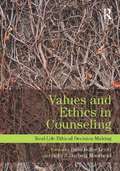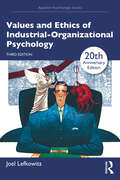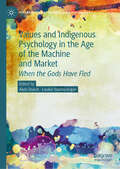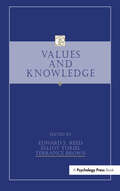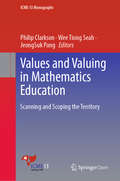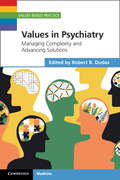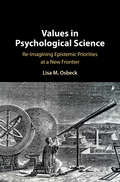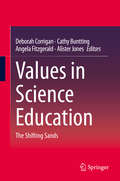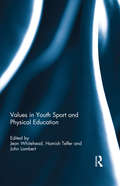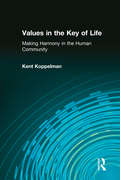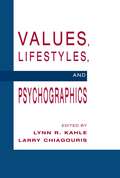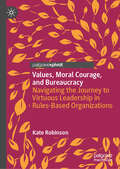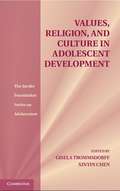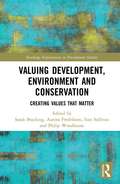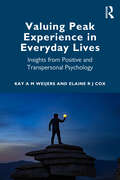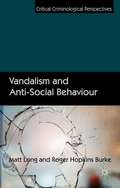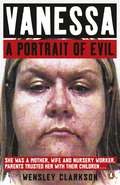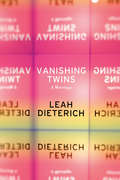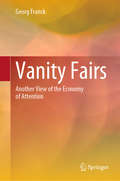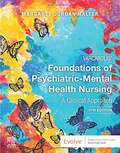- Table View
- List View
Value Systems and Social Process (Pelican Ser.)
by Geoffrey VickersTavistock Press was established as a co-operative venture between the Tavistock Institute and Routledge & Kegan Paul (RKP) in the 1950s to produce a series of major contributions across the social sciences. This volume is part of a 2001 reissue of a selection of those important works which have since gone out of print, or are difficult to locate. Published by Routledge, 112 volumes in total are being brought together under the name The International Behavioural and Social Sciences Library: Classics from the Tavistock Press. Reproduced here in facsimile, this volume was originally published in 1968 and is available individually. The collection is also available in a number of themed mini-sets of between 5 and 13 volumes, or as a complete collection.
Values & Ethics in Counselling and Psychotherapy
by Gillian M ProctorThis book offers an introduction to values and ethics in counselling and psychotherapy, helping you to develop the ethical awareness needed throughout the counselling process. The book covers: - Context and emergence of ethics in counselling - Exercises to explore personal and professional values - Tools to develop ethical mindfulness - Differences between therapeutic models - Relational ethics - Ethical dilemmas and issues - Practice issues including confidentiality, boundaries and autonomy versus beneficence. Using in-depth case studies of counselling students, the author demonstrates the constant relevance of values and ethics to counselling and psychotherapy, equipping trainees with the tools to successfully navigate values and ethics in their professional practice.
Values Pedagogy and Student Achievement
by Terence Lovat Kerry Dally Neville Clement Ron ToomeyUnder the weight of a combination of forces, many of the older paradigms of learning are being questioned in our time. Among the updated research that elicits such critique is that which deals directly with effective pedagogy, clearly illustrating the enhanced effects on learning when it is dealt with as a holistic developmental enterprise rather than one concerned solely with content, technique and measurable outcomes. This research includes volumes of empirical evidence and conceptual analysis from across the globe that point to the inextricability of values as lying at the heart of those forms of good practice pedagogy that support and facilitate the species of student achievement that truly does transform the life chances of students. This research indicates that the combination of values rich learning environments and values discourse (that is, the holism of implicit and explicit pedagogy) has potential for positive influence on learning outcomes, most markedly for those deemed likely to fail without such pedagogical intervention. Values Pedagogy and Student Achievement - Contemporary Research Evidence uncovers, explores and appraises those volumes of evidence and analysis, illustrating their pertinence to student achievement, the vexed issue that lies at the heart of all for which education stands.
Values and Behavior
by Sonia Roccas Lilach SagivWhat are values? How are they different from attitudes, traits, and specific goals? How do our values influence our behavior, and vice versa? How does our culture and environment impact the relationship between values and behavior? These questions and more are rigorously examined by prominent and emerging scholars in this significant volume Values and Behavior: Taking A Cross Cultural Perspective. Personal values are cognitive representations of abstract, desirable motivational goals that guide the way individuals select actions, evaluate people and events, and explain their actions and evaluations. The unique features of values have implications for their impact on behavior. People are highly satisfied with their values and perceive them as close to their ideal selves. At the same time, however, daily interpersonal interaction reveals that individuals hold different, sometimes opposing, value profiles. These individual differences are even more apparent when individuals from different cultures interact. The collected chapters address the links between values and behavior from a cultural perspective. They review studies conducted in various cultures and discuss culture as a moderator of the relationships between values and behavior. Structurally, part I of the volume discusses what values are and how they should be measure; part II then examines the contents of the relationships between values and behavior in different life-domains, including prosocial behavior, aggression, behavior in organizations and relationships formation. Part III explores some of the moderating mechanisms that relate values to behavior. Taken together, these chapters review and synthesize over twenty years of research on values and behavior, and propose new insights that have important implications for both research and for practice.
Values and Ethics in Counseling: Real-Life Ethical Decision Making
by Dana Heller Levitt Holly J. Hartwig MoorheadMany counselors learn about ethics in graduate school by applying formal, step-by-step ethical decision-making models that require counselors to be aware of their values and refrain from imposing personal values that might harm clients. However, in the real world, counselors often make split-second ethical decisions based upon personal values. Values and Ethics in Counseling illustrates the ways in which ethical decisions are values—but more than that, it guides counselors through the process of examining their own values and analyzing how these values impact ethical decision making. Each chapter presents ethical decision making as what it is: a very personal, values-laden process, one that is most effectively illustrated through the real-life stories of counselors at various stages of professional development—from interns to seasoned clinicians—who made value-based decisions. Each story is followed by commentary from the author as well as analysis from the editors to contextualize the material and encourage reflection.
Values and Ethics of Industrial-Organizational Psychology (Applied Psychology Series)
by Joel LefkowitzThis foundational text was one of the first books to integrate work from moral philosophy, developmental/moral psychology, applied psychology, political and social economy, and political science, as well as business scholarship. Twenty years on, this third edition utilizes ideas from the first two to provide readers with a practical model for ethical decision making and includes examples from I-O research and practice, as well as current business events. The book incorporates diverse perspectives into a "framework for taking moral action" based on learning points from each chapter. Examples and references have been updated throughout, and sections on moral psychology, economic justice, the "replicability crisis," and open science have been expanded and the "radical behavioral challenge" to ethical decision-making is critiqued. In fifteen clearly structured and theory-based chapters, the author also presents a variety of ethical incidents reported by practicing I-O psychologists. This is the ideal resource for Ethics and I-O courses at the graduate and doctoral level. Academics in Organizational Behavior and Human Resource Management will also benefit from this book, as well as anyone interested in Ethics in Psychology and Business.
Values and Ethics of Industrial-Organizational Psychology (Applied Psychology Series)
by Joel LefkowitzThis foundational text was one of the first books to integrate work from moral philosophy, developmental/moral psychology, applied psychology, political and social economy, and political science, as well as business scholarship. Twenty years on, this third edition utilizes ideas from the first two to provide readers with a practical model for ethical decision making and includes examples from I-O research and practice, as well as current business events. The book incorporates diverse perspectives into a "framework for taking moral action" based on learning points from each chapter. Examples and references have been updated throughout, and sections on moral psychology, economic justice, the "replicability crisis," and open science have been expanded and the "radical behavioral challenge" to ethical decision-making is critiqued. In fifteen clearly structured and theory-based chapters, the author also presents a variety of ethical incidents reported by practicing I-O psychologists.This is the ideal resource for Ethics and I-O courses at the graduate and doctoral level. Academics in Organizational Behavior and Human Resource Management will also benefit from this book, as well as anyone interested in Ethics in Psychology and Business.
Values and Indigenous Psychology in the Age of the Machine and Market: When the Gods Have Fled (Palgrave Studies in Indigenous Psychology)
by Louise Sundararajan Alvin DueckThis interdisciplinary edited collection addresses issues at the intersection of indigenous psychology, market ideology, values, and technology. The aims of this book arise from the recognition that whereas the unfolding of the agricultural revolution over thousands of years allowed for the gradual co-evolution of values and technology to blossom, the post-industrial technological revolution is so accelerated that there has been little time for the co-evolution of values. To address this, the chapters collected here seek to initiate a conversation that will provide the conceptual space for the evolution of values that can keep pace with contemporary developments in the machine and the market. In this conversation, they argue, indigenous psychologies will necessarily play a central role for two reasons: firstly, as alternative systems of thought they enable a productive interrogation of the rationality of machine and the market; and second, examples of the impact of technology and the market on traditional societies hold lessons for potential future impacts on the society as a whole. This timely work offers fresh insights that will appeal to students and scholars of psychology, cultural and religious studies, anthropology, business and economics, and science and technology studies.
Values and Knowledge (Jean Piaget Symposia Series)
by Elliot Turiel Terrance Brown Edward S. ReedIt is widely recognized that a person's values will profoundly affect what that person attends to, thinks about, and remembers. Yet, despite this, psychologists have only begun to study and think about the deep connections between values and knowledge. This volume explores this important area in psychology by offering an overview of what is known about the developmental role of valuation in the acquisition of knowledge, and also by examining a range of new ideas for understanding the intricate connection between evaluation and thinking. More specifically, the text: provides a historical overview of philosophical and psychological theories relating the values and knowledge; reviews the importance of values for infants and their caretakers in the origins of both cognition and social relations; offers a provocative view of how the differences among families in their values may have profound affects on psychological development; explicates the development of a personal sphere within which one strives to shape one's own values; emphasizes the heterogeneity of valuation inherent in every culture and how conflicts of values are likely to be common and important to human development; presents eye-opening research on social-cognitive limitations of average people in respecting the points of view of others; and summarizes and critiques Piaget's theory of the role of values in development. For practitioners in the fields of developmental and social psychology, and education, this volume will introduce a number of important and current issues, from multiculturality and gender to the differential roles of temperament and upbringing in development. The emphasis is placed squarely on developing individuals and how they shape themselves in a world that is structured by values as well as by facts.
Values and Valuing in Mathematics Education: Scanning and Scoping the Territory (ICME-13 Monographs)
by Philip Clarkson Wee Tiong Seah JeongSuk PangThis engaging open access book discusses how a values and valuing perspective can facilitate a more effective mathematics pedagogical experience, and allows readers to explore multiple applications of the values perspective across different education systems. It also clearly shows that teaching mathematics involves not only reasoning and feelings, but also students’ interactions with their cultural setting and each other.The book brings together the work of world leaders and new thinkers in mathematics educational research to improve the learning and teaching of mathematics. Addressing themes such as discovering hidden cultural values, a multicultural society and methodological issues in the investigation of values in mathematics, it stimulates readers to consider these topics in cross-cultural ways, and offers suggestions for research and classroom practice.It is a valuable resource for scholars of mathematics education, from early childhood through to higher education and an inspiring read for all mathematics teachers.
Values in Psychiatry: Managing Complexity and Advancing Solutions (Values-Based Practice)
by Robert B. DudasThis fascinating book brings together a multidisciplinary team of authors from a variety of backgrounds and lived experience who offer insight into the historical roots and current reasons for the hybrid natural and social scientific conceptual platform of psychiatry. The role of values in the development and recovery from mental illness are covered as well as progressive developments, outlining a novel research methodology. Demonstrating the importance of the integration of each main dimension of psychiatry (such as biological, psychological, social, and existential), the book includes values in theory and research in working out the epistemological foundations of psychiatry as an academic discipline and in clinical practice. Covering the major directions from which the subject of mental ill health has been approached (neurobiology, psychoanalysis and the psychotherapies), the common conditions and the controversies surrounding them are explored. Highly relevant to academics, clinicians and students in psychiatry, psychology, primary and social care.
Values in Psychological Science: Re-imagining Epistemic Priorities At A New Frontier
by Lisa OsbeckIn this book, wide-ranging sources are utilized to seek alternatives to the science-value dichotomy and to move beyond unhelpful impasses between qualitative and quantitative methods. It urges new directions of impact for psychology through intra- and interdisciplinary collaboration in order to confront unprecedented global challenges, generate questions and articulate new possibilities for a sustainable future for humanity. The analysis places the researcher as the principal instrument of any science - an affordance and an ongoing form of demand. Foregrounding 'the personal' also emphasizes continuity across arts and sciences; the interfaces of which contain the full range of resources for innovative thinking. The enduring relevance of observation, imaginative sense-making, and perspective-taking to psychology are explored. In emphasizing that 'the person' and 'the personal' reflect interconnected systems of various levels, the book calls for an appreciation and cultivation of these activities in the psychological scientific community.
Values in Science Education: The Shifting Sands
by Angela Fitzgerald Alister Jones Cathy Buntting Deborah CorriganIn 2007, the Monash-Kings College London International Centre for the Study of Science and Mathematics Curriculum edited a book called The Re-emergence of Values in Science Education. This book reflects on how values have been considered since this original publication, particularly in terms of socio-cultural, economic and political factors that have impacted broadly on science, technology and society, and more specifically on informal and formal science curricula. Hence, the title of this book has been framed as Values in Science Education: The shifting sands. As in the first book, this collection focuses on values that are centrally associated with science and its teaching, and not the more general notion of values such as cooperation or teamwork that are also important values in current curricula. Such values have indeed become more of a focus in science education. This may be a response to the changing global context, where technological changes have been rapid and accelerating. In such complex and risky environments, it is our guiding principles that become the important mainstays of our decisions and practices. In terms of science education, what is becoming clearer is that traditional content and traditional science and scientific methods are not enough for science and hence science education to meet such challenges. While shifts in values in science education continue, tensions remain in curriculum development and implementation, as evidenced by the continued diversity of views about what and whose values matter most.
Values in Youth Sport and Physical Education
by John Lambert Jean Whitehead Hamish TelferAs sport has become more intense, professional and commercialized so have the debates grown about what constitutes acceptable behaviour and fair play, and how to encourage and develop ‘good’ sporting behaviour, particularly in children and young people. This book explores the nature and function of values in youth sport and establishes a framework through which coaches, teachers and researchers can develop an understanding of the decision-making processes of young athletes and how they choose between playing fairly or cheating to win. The traditional view of sport participation is that it has a beneficial effect on the social and moral development of children and young people and that it intrinsically promotes cultural values. This book argues that the research evidence is more subtle and nuanced. It examines the concept of values as central organizing constructs of human behaviour that determine our priorities, guide our choices, and transfer across situations, and considers the value priorities and conflicts that are so useful in helping us to understand behaviour in sport. The book argues that teachers and professionals working with children in sport are centrally important agents for value transmission and change and therefore need to develop a deeper understanding of how sport can be used to encourage pro-social values, and offers suggestions for developing a curriculum for teaching values through sport in differing social contexts. Spanning some of the fundamental areas of sport practice and research, including sport psychology, sport pedagogy, practice ethics, and positive youth development through sport, and including useful values and attitudes questionnaires and guidance on their use and interpretation, this book is important reading for any student, researcher, coach or teacher with an interest in youth sport or physical education.
Values in the Key of Life: Making Harmony in the Human Community
by Kent L KoppelmanFirst Published in 2017. Routledge is an imprint of Taylor & Francis, an Informa company.
Values, Lifestyles, and Psychographics
by Lynn R. Kahle Larry ChiagourisThis book showcases papers presented at the annual Advertising and Consumer Psychology Conference. The contributors -- active scholars with both practitioner and academic backgrounds -- share an interest in the general area of psychographics, values, and lifestyle in advertising. The interdisciplinary and international mix of authors bring a diverse perspective to this volume, which is divided into four nonorthogonal sections. The first section deals with theoretical and conceptual issues in advertising research, while the second section presents chapters devoted to improving methodology. The final two sections illustrate how value, lifestyle, and psychographic research have been used to understand differences among people. The first of these final two sections emphasizes differences among people at different times (commonly called trend research), and the second emphasizes differences among people across national boundaries. Collectively, these chapters illustrate how practical state-of-the-art research in values, lifestyles, and psychographics can be. Thoughtful consideration of values, lifestyles, and psychographics as they are manifested in quality research can improve advertising and marketing practice, and can help the business community deliver products and services that are more in line with consumers' needs.
Values, Moral Courage, and Bureaucracy: Navigating the Journey to Virtuous Leadership in Rules-Based Organizations
by Kate RobinsonThis book focuses on understanding values-based leadership in rules-based organizations. It assists leaders, whether they are Board Members, CEOs, Executives, or Middle to Lower Management, in understanding how to enact and embody values/virtues-based leadership. Of particular interest to readers are the discussions around primary data collected from participants at three levels of leadership in the military who responded to a vignette and interview. The results of the case study are used in conjunction with current trends or practices that are considered unethical and questionable behavior which undermine trust and integrity in organizations. By using a case study from the military, the highly codified rules-based organization illustrates the tensions, contradictions, and paradoxes that leaders face and provide a teachable moment for leaders in all industries the complexities in achieving virtue eudaimonia. In doing so, the book also illustrates the tension and complexities between an individual’s multiple subject positions, organizational rules and values, and the ability to have agency.
Values, Religion, and Culture in Adolescent Development
by Xinyin Chen Gisela TrommsdorffCultural values and religious beliefs play a substantial role in adolescent development. Developmental scientists have shown increasing interest in how culture and religion are involved in the processes through which adolescents adapt to environments. This volume constitutes a timely and unique addition to the literature on human development from a cultural-contextual perspective. Editors Gisela Trommsdorff and Xinyin Chen present systematic and in-depth discussions of theoretical perspectives, landmark studies, and strategies for further research in the field. The eminent contributors reflect diverse cultural perspectives, transcending the Western emphasis of many previous works. This volume will be of interest to scholars and professionals interested in basic developmental processes, adolescent social psychology, and the sociological and psychological dimensions of religion.
Valuing Development, Environment and Conservation: Creating Values that Matter (Routledge Explorations in Development Studies)
by Philip Woodhouse Sarah Bracking Sian Sullivan Aurora FredriksenPolicy-makers are increasingly trying to assign economic values to areas such as ecologies, the atmosphere, even human lives. These new values, assigned to areas previously considered outside of economic systems, often act to qualify, alter or replace former non-pecuniary values. Valuing Development, Environment and Conservation looks to explore the complex interdependencies, contradictions and trade-offs that can take place between economic values and the social, environmental, political and ethical systems that inform non-monetary valuation processes. Using rich empirical material, the book explores the processes of valuation, their components, calculative technologies, and outcomes in different social, ecological and conservation domains. The book gives reasons for why economic calculation tends to dominate in practice, but also presents new insights on how the disobedient materiality of things and the ingenuity of human and non-human agencies can combine and frustrate the dominant economic models within calculative processes. This book highlights the tension between, on the one hand, a dominant model that emphasises technical and ‘universalising’ criteria, and on the other hand, valuation practice in specific local contexts which is more likely to negotiate criteria that are plural, incommensurable and political. This book is perfect for researchers and students within development studies, environment, geography, politics, sociology and anthropology who are looking for new insights into how processes of valuation take place in the 21st century, and with what consequential outcomes.
Valuing Peak Experience in Everyday Lives: Insights from Positive and Transpersonal Psychology
by Kay A Weijers Elaine R CoxValuing Peak Experience in Everyday Lives takes Abraham Maslow’s concept of peak experience and compares how people have encountered transcendent peak experiences and related phenomena, such as flow and peak performance, in their everyday lives. By examining existing research and sharing people’s actual encounters in different contexts, such as music, education, sport, creative arts, and nature, the importance and value of peak experiences and self-transcendence in our lives can be better understood and fostered. The book explores the challenges, benefits, and opportunities presented by understanding peak experience in contemporary contexts. Drawing on research from positive and transpersonal psychology, each of the 12 chapters reports on a work or leisure context where peak experiences have been generated and studied. The chapters are introduced by drawing on relevant theory and research, and then expanded via accounts, vignettes, and examples from people immersed in those activities or contexts to provide a blend of case stories and theoretical foundations. The book is valuable reading for professional practitioners such as psychologists, educators, coaches, psychotherapists, and those interested in personal development. Also, it will be relevant for students of transpersonal and positive psychology, as well as humanism and human development, interested in understanding transcendent peak experiences and related concepts, such as flow.
Vandalism and Anti-Social Behaviour
by Roger Hopkins Burke Matt LongThere has been a lack of theorisation and conceptualisation of vandalism and anti-social behaviour in criminology in the decades following Cohen's seminal typology of vandalism in the 1970s. This important book forwards a new typology of vandalism, one that addresses the various challenges of the late modern world, rather than the older industrial world Cohen addressed. Matt Long and Roger Hopkins Burke analyse the various types of vandalism and anti-social behaviour conducted by individuals. However, they highlight that individuals are not always the locus of blame - the state also has the capacity to act in a profoundly anti-social way. Crucially, Long and Hopkins Burke argue that in order to fully understand vandalism and anti-social behaviour, a culturally criminological perspective should be fostered. This is a perspective which accounts for both the emotional and experiential aspects of crime as well as its broader social and political contexts.
Vanessa: A Portrait of Evil
by Wensley ClarksonThe compelling and disturbing true story of Vanessa George and the evil abuse she doled out upon the children of more than 300 families.As a nursery worker, wife and mother, she was a figure to place trust in. Yet her adulterous relationship and sick love triangle with Colin Blanchard and Angela Allen drew her into a dark world of violence and sexual abuse. To compete for Blanchard's attention she would do everything in her power to impress him, even if this meant committing unspeakable acts of sexual violence on children as young as two years old.What could have driven a mother to betray not only her daughters and loving husband, but the very families who entrusted her with their children? How could a seemingly caring women become engaged in a sordid and vile love triangle with a man and woman she had never met? Were there events in her own childhood that pushed her to commit these acts?True crime expert Wensley Clarkson pieces together the events surrounding the case as well as new investigative research to compile a fascinating yet disturbing account of a case which shocked a nation.We may never know the full extent of Vanessa George's cruelty, but the horror of her story will remain as a chilling memory for generations.
Vanishing Twins: A Marriage
by Leah Dieterich"[Dieterich's] writing is crisp and intelligent . . . She writes about her own reckoning with her sexuality and exploration of queer identity without becoming pat or coy, giving readers intimate access to her fears and conflicting emotions." --NPRFor as long as she can remember, Leah has had the mysterious feeling that she’s been searching for a twin--that she should be part of an intimate pair. It begins with dance partners as she studies ballet growing up; continues with her attractions to girlfriends in college; and leads her, finally, to Eric, whom she moves across the country for and marries. But her steadfast, monogamous relationship leaves her with questions about her sexuality and her identity, so she and her husband decide to try an open marriage.How does a young couple make room for their individual desires, their evolving selfhoods, and their artistic ambitions while building a life together? Can they pursue other sexual partners, even live in separate cities, and keep their original passionate bond alive? Vanishing Twins looks for answers in psychology, science, pop culture, art, architecture, Greek mythology, dance, and language to create a lucid, suspenseful portrait of a woman testing the limits and fluidities of love.
Vanity Fairs: Another View of the Economy of Attention
by Georg FranckThis book offers readers a comprehensive introduction to the economy of attention from the perspective of the basic motive of the pursuit of attention: self-esteem. As a jumping-off point, it states the stark equation at the heart of this economy— that the self-esteem one can afford depends on one’s income of appreciative attention. The information markets in which participants compete to play a role in the consciousness of others are described as ‘vanity fairs’. Since the pursuit of self-esteem is highly effective when it comes to mobilizing human energies, vanity fairs are not just playgrounds of individual passions, but have been utilized by society since time immemorial as markets for particularly challenging demands.Starting with an analysis of the interface that connects the social economy of attention with the intra-psychic economy of self-esteem, the book then examines two main cases in point: modern science and the post-modern media culture. On the one hand we have scientists working for a ‘wage of fame’, who invest their own attention into getting the attention of others. On the other, today’s dominant media have left the sale of information behind to focus solely on the attraction of attention, which is sold as a service to the advertising industry. In each case the use of attention as a means of payment is key to its phenomenal success. But success comes at a price: the dark side of this monetization of attention is a kind of ’climate change’ in the collective mental sphere which threatens the very existence of our social fabric.
Varcarolis' Foundations of Psychiatric-Mental Health Nursing: A Clinical Approach
by Margaret Jordan HalterPrepare for psychiatric nursing care with this comprehensive, evidence-based text! Varcarolis' Foundations of Psychiatric-Mental Health Nursing: A Clinical Approach, 9th Edition makes it easy to understand the complexities of psychiatric disorders and how to provide quality mental and behavioral health care. Clinical chapters follow the nursing process framework and progress from theory to application, preparing you for practice with real-world examples. Other notable features include illustrated explanations of the neurobiology of disorders, DSM-5 criteria for major disorders, and nursing care plans. From clinical nurse specialist and lead author Dr. Margaret Jordan Halter, this bestselling text includes new Next Generation NCLEX® content to prepare you for success on your PMHN certification exam.
